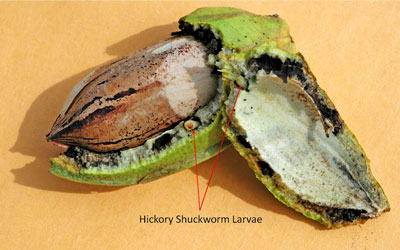Question of the Week – Number 1: November 23, 2017
“Neil, every year we have a lot of pecans that don’t fall at the normal time (now). When they do fall they are hollow. Why does that happen, and what can we do to stop it?”
Hickory shuckworms cause that to happen.
I’m going to explain it to you as I recall hearing it from state fruit and pecan experts over the years.

Photo: Pecans are sticking in trees, failing to fall normally, due primarily to hickory shuckworms.
Here’s how it happens…
Pecan fruit enlarge during the summer, but the actual kernels don’t develop until late in the summer. That’s the point at which hickory shuckworm moths lay their eggs and the larvae begin tunneling within the outer husks.
Water and nutrients enter the pecan fruit and kernels from the ends farther from the roots, which means that if shuckworms have disrupted the conducting systems with their tunnels, the kernels won’t fill out properly.
All of that interrupts the ripening process, so the pecans don’t mature at the right time, so they hang in the trees well into the winter and even into spring. When they do fall the damaged shucks are often still attached and the kernels are shriveled.

Photo: William Reid was Pecan Research Specialist serving Kansas and Missouri when he posted this photo on his website several years ago. It illustrates the damage done by hickory shuckworms.
Means of control…
Hickory shuckworms overwinter in the fallen debris, so if you keep all the husks blown and picked up as they hit the ground you’ll be eliminating a big source of the next year’s population.
Spraying with a labeled insecticide in early August and again in late August will help stop the onslaught. That’s also the time when you would be spraying for pecan weevils, so the same applications can actually serve double duty. Carbaryl and spinosad are both listed by Texas A&M.
